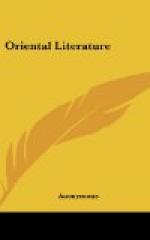THE RUIN OF BARMECIDES[13]
No, Barmec! Time hath never shown
So sad a change of wayward
fate;
Nor sorrowing mortals ever known
A grief so true, a loss so
great.
Spouse of the world! Thy soothing
breast
Did balm to every woe afford;
And now no more by thee caress’d,
The widow’d world bewails
her Lord.
[13] The family of Barmec was one of the most illustrious
in the
East. They were
descended from the ancient kings of Persia, and
possessed immense property
in various countries; they derived still
more consequence from
the favor which they enjoyed at the court of
Bagdad, where, for many
years, they filled the highest offices of
the state with universal
approbation.
TO TAHER BEN HOSIEN[14]
A pair of right hands and a single dim
eye
Must form not a man, but a monster, they
cry:—
Change a hand to an eye, good Taher, if
you can,
And a monster perhaps may be chang’d
to man.
[14] Taher Ben Hosien was ambidexter and one-eyed
and, strange to say,
the most celebrated
general of his time.
THE ADIEU[15]
The boatmen shout, “Tis time to
part,
No longer we can stay”—
’Twas then Maimnna taught my heart
How much a glance could say.
With trembling steps to me she came;
“Farewell,” she
would have cried,
But ere her lips the word could frame
In half-form’d sounds
it died.
Then bending down with looks of love,
Her arms she round me flung,
And, as the gale hangs on the grove,
Upon my breast she hung.
My willing arms embraced the maid,
My heart with raptures beat;
While she but wept the more and said,
“Would we had never
met!”
Abou Mohammed.
[15] This was sung before the Caliph Wathek, by Abou
Mohammed, a
musician of Bagdad,
as a specimen of his musical talents; and such
were its effects upon
the Caliph, that he immediately testified his
approbation of the performance
by throwing his own robe over the
shoulders of Abou Mohammed,
and ordering him a present of an hundred
thousand dirhems.
TO MY MISTRESS[16]
Ungenerous and mistaken maid,
To scorn me thus because I’m
poor!
Canst thou a liberal hand upbraid
For dealing round some worthless
ore?
To spare’s the wish of little souls,
The great but gather to bestow;
Yon current down the mountain rolls,
And stagnates in the swamp
below.
Abou Teman Habib.
[16] Abou Teman is considered the most excellent of
all the Arabian
poets. He was born
near Damascus A.H. 190, and educated in Egypt;
but the principal part
of his life was spent at Bagdad, under the
patronage of the Abasside
Caliphs.




